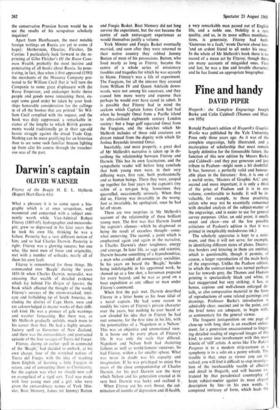Darwin's captain
OLIVER WARNER
What a pleasure it is to come upon a bio- graphy which is at once scrupulous, well mannered and concerned with a subject emi- nently worth while. Vice-Admiral Robert Fitzroy (1805-65), hydrographer and meteorolo- gist, grew so depressed in his later years that he took his own life, thinking he was a failure. Posterity has a very different notion of him, and so had Charles Darwin. Posterity is right; Fitzroy was a glowing success; but one who, like most men of force and originality, met with a number of setbacks, nearly all of them his own fault.
Fitzroy is remembered for three things. He commanded HMS 'Beagle' during the years 1831-36 when Charles Darwin, naturalist, was amassing that wealth of detailed evidence which lay behind The Origin of Species, the book which affected the thought of the world. Fitzroy's surveys of the storm-wracked, intri- cate and forbidding tip of South America, in- cluding the district of Cape Horn, were and are acknowledged as master works of their diffi- cult kind. He was a pioneer of gale warnings and weather forecasting. But there was, as Mr Mellersh gradually unfolds, much more to his career than that. He had a highly unsatis- factory spell as Governor of New Zealand, and there was the extraordinary and protracted episode of the four savages of Tierra del Fuego.
Fitzroy, during an earlier spell in command of the 'Beagle,' had decided to embark, at his own charge, four of the wretched natives of Tierra del Fuego, with the idea of teaching them English, of learning a little Fuegian in return, and of converting them to Christianity, for the captain was what we should now call an evangelical of a rigid sort. Trial was made with four young men and a girl, who were given the extraordinary names of York Min- ster, Boat Memory, James (or Jemmy) Button and Fuegia Basket. Boat Memory did not long survive the experiment, but the rest became the centre of such extravagant experiences as would themselves justify a volume.
York Minster and Fuegia Basket eventually married, and soon after they were returned to their native country they robbed Jemmy Button of most of his possessions. Button, who lived nearly as long as Fitzroy, became the centre of a whole series of missionary troubles and tragedies for which he was scarcely to blame. Fitzroy's was a life of experiment. The Fuegians, for all the interest they aroused from William IV and Queen Adelaide down- wards, were not among his successes, and they caused him more worry and expense than perhaps he would ever have cared to admit. It is possible that Fitzroy had in mind the acclaim which Captain James Cook had had when he brought Omai from a Pacific island to ultra-civilised eighteenth century London society: but a huge gulf separated Omai from the Fuegians, and the sketches which Mr Mellersh includes of those odd creatures are distant indeed from the dignity with which Sir Joshua Reynolds invested Omai.
Inevitably, and most properly, a great deal of Mr Mellersh's narrative is taken up in de- scribing the relationship between Fitzroy and Darwin. This has its own fascination, and the sympathetic reader will before long conclude that both young men were, in their very differing ways, first rate, both professionally and as human beings. There they were, cooped up together for four years in the captain's tiny cabin of a ten-gun brig. Sometimes they quarrelled, occasionally seriously. When they did so, Fitzroy was invariably in the wrong. Just as invariably, he apologised, once he had let off steam.
There are two surprises in Mr Mellersh's account of the relationship of these brilliant young men. The first was that Darwin found the captain's silences—which he diagnosed as being the result of ceaseless thought—some- what unnerving. The second, a point which is emphasised again and again in the narrative, is Charles Darwin's sheer toughness, energy and courage. In later life, as sage and scientist, Darwin became something of a hypochondriac, a man who avoided all unnecessary sodalities.
In his years on board the 'Beagle,' besides being indefatigable in his appointed work, he showed up as a fine shot, a horseman prepared for every hazard, and he was as good on a boat expedition as any officer or man under Fitzroy's command. When first the pair met, Darwin described Fitzroy in a letter home as his beau ideal of a naval captain. He had some reason to modify his views of Fitzroy's private character over the years, but nothing he ever heard or saw clouded his idea that in Fitzroy he had met someone, for the first time in his life, with the potentialities of a 'Napoleon or a Nelson.' This was an objective and unemotional view. It is borne out by every phase of Fitzroy's life. It was only the scale that differed. Napoleon and Nelson both had shattering failures as well as world-famous successes. So had Fitzroy, within a far smaller sphere. What was never in doubt was his capacity and imagination. If he was privileged to enjoy five years of the close companionship of Charles Darwin, for his part Darwin saw the navy which Nelson and his generation created at its very best. Darwin was lucky and realised it., When Fitzroy cut his own throat, the cul- mination of months of depression and ill-health,
a very remarkable man passed out of English life, and a noble one. Nobility is a rare quality, and so, in its more selfless manifesta- tions, is generosity. Fitzroy had both. 'Generous to a fault,' wrote Darwin about him, 'and an ardent friend to all under his sway: In the whole of Mr Mellersh's book there is no record of a mean act by Fitzroy, though there are many accounts of misguided ones. First and last, he was a fine and lovable character; and he has found an appropriate biographer.


































 Previous page
Previous page